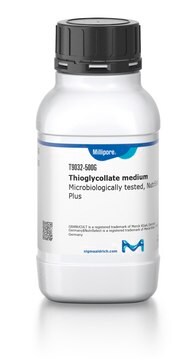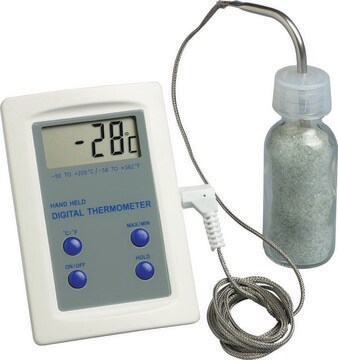1.07179
n-Pentane
for spectroscopy Uvasol®
Synonym(s):
Pentane
About This Item
Recommended Products
vapor density
2.48 (vs air)
Quality Level
Assay
≥99.5% (GC)
form
liquid
autoignition temp.
500 °F
potency
>2000 mg/kg LD50, oral (Rat)
expl. lim.
~8.3 %
technique(s)
UV/Vis spectroscopy: suitable
impurities
≤0.0002 meq/g Acidity
≤0.0002 meq/g Alkalinity
≤0.005% Water
evapn. residue
≤0.0002%
color
APHA: ≤10
transmittance
200 nm, ≥50%
210 nm, ≥70%
215 nm, ≥85%
225 nm, ≥95%
240 nm, ≥98%
refractive index
n20/D 1.358 (lit.)
bp
35-36 °C (lit.)
mp
−130 °C (lit.)
transition temp
flash point -48 °C (refers to pure substance)
solubility
0.4 g/L
density
0.626 g/mL at 25 °C (lit.)
UV absorption
λ: 200 nm Amax: ≤0.30
λ: 210 nm Amax: ≤0.16
λ: 215 nm Amax: ≤0.07
λ: 225 nm Amax: ≤0.02
λ: 240 nm Amax: ≤0.01
storage temp.
2-30°C
SMILES string
CCCCC
InChI
1S/C5H12/c1-3-5-4-2/h3-5H2,1-2H3
InChI key
OFBQJSOFQDEBGM-UHFFFAOYSA-N
Looking for similar products? Visit Product Comparison Guide
Related Categories
General description
Application
- Quantitative determination of nitrous oxide in human blood by HS-GC-MS: forensic application of two fatal poisoning cases.: This study leverages n-Pentane in headspace gas chromatography-mass spectrometry (HS-GC-MS) for the forensic analysis of nitrous oxide in human blood. Highlighting its importance in forensic science, the research demonstrates n-Pentane′s utility in providing accurate and reliable measurements essential for legal and medical evaluations (Li Z et al., 2024).
- A photochromic trinuclear dysprosium(iii) single-molecule magnet with two distinct relaxation processes.: This article describes the use of n-Pentane in the synthesis of a dysprosium-based single-molecule magnet, showcasing its role in developing materials with unique magnetic properties for potential applications in quantum computing and data storage (Rogacz K et al., 2024).
- Reduction of Thorium Tris(amido)arene Complexes: Reversible Double and Single C-C Couplings.: This research employs n-Pentane in the study of thorium complexes, providing insights into reversible carbon-carbon coupling reactions. The findings contribute to the understanding of actinide chemistry and its application in recycling and waste reduction strategies (Deng C et al., 2024).
- Tuning Reactivities of tert-Butyllithium by the Addition of Stoichiometric Amounts of Tetrahydrofuran.: The study utilizes n-Pentane to adjust the reactivity of tert-butyllithium, illustrating its significant role in enhancing the control over chemical reactions. This advancement is pivotal for the synthesis of complex molecules in pharmaceuticals and materials science (Kleinheider J et al., 2024).
- Steps to achieve carvone-rich spearmint (Mentha spicata L.) essential oil: a case study on the use of different distillation methods.: In this research, n-Pentane is examined for its efficacy in extracting high-quality essential oils from spearmint, demonstrating its versatility in botanical extractions and its impact on the quality and characteristics of the essential oils obtained (Moradi-Sadr J et al., 2023).
Analysis Note
Evaporation residue: ≤ 0.0002 %
Water: ≤ 0.005 %
Colour: ≤ 10 Hazen
Acidity: ≤ 0.0002 meq/g
Alkalinity: ≤ 0.0002 meq/g
Fluorescence (as quinine at 254 nm): ≤ 1.0 ppb
Fluorescence (as quinine at 365 nm): ≤ 1.0 ppb
Transmission (at 200 nm): ≥ 50 %
Transmission (at 210 nm): ≥ 70 %
Transmission (at 215 nm): ≥ 85 %
Transmission (at 225 nm): ≥ 95 %
Transmission (from 240 nm): ≥ 98 %
Absorbance (at 200 nm): ≤ 0.30
Absorbance (at 210 nm): ≤ 0.16
Absorbance (at 215 nm): ≤ 0.07
Absorbance (at 225 nm): ≤ 0.02
Absorbance (from 240 nm): ≤ 0.01
Meet the requirements of "Specific use spectroscopy" according Reag. Ph Eur
Other Notes
Legal Information
related product
Signal Word
Danger
Hazard Statements
Precautionary Statements
Hazard Classifications
Aquatic Chronic 2 - Asp. Tox. 1 - Flam. Liq. 2 - STOT SE 3
Target Organs
Respiratory system
Supplementary Hazards
Storage Class Code
3 - Flammable liquids
WGK
WGK 2
Flash Point(F)
-40.0 °F
Flash Point(C)
-40 °C
Certificates of Analysis (COA)
Search for Certificates of Analysis (COA) by entering the products Lot/Batch Number. Lot and Batch Numbers can be found on a product’s label following the words ‘Lot’ or ‘Batch’.
Already Own This Product?
Find documentation for the products that you have recently purchased in the Document Library.
Our team of scientists has experience in all areas of research including Life Science, Material Science, Chemical Synthesis, Chromatography, Analytical and many others.
Contact Technical Service









